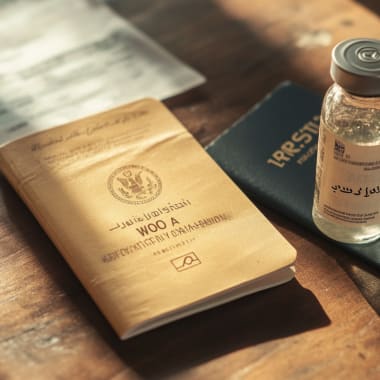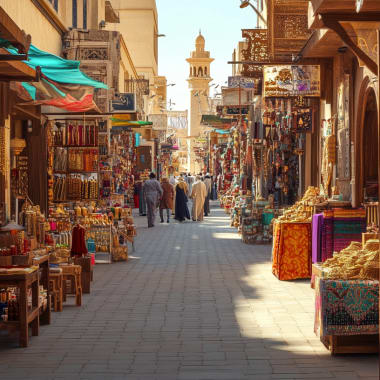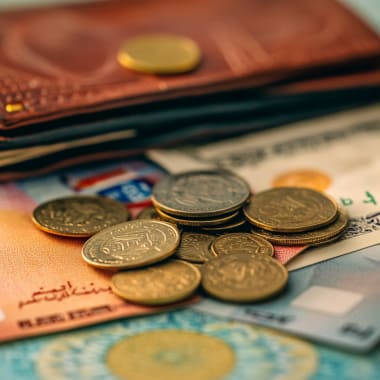
Transport options on-site in Bahrain
How to move safely, flexibly, and efficiently in Bahrain – with practical tips on taxis, buses, rental cars, and apps.
How to move safely, flexibly, and efficiently in Bahrain – with practical tips on taxis, buses, rental cars, and apps.
Whether for spontaneous city explorations or relaxed day trips: Bahrain offers individual travelers a well-developed selection of transport options. From classic taxis to modern ride-hailing apps and a functional bus network – depending on your needs and destination, you will find a suitable solution for your mobility on-site. Especially in and around Manama, at the international airport, and near hotels, availability is reliable. Below, we present the most important options in detail.
Taxis in Bahrain
Taxis are widespread in Bahrain and are considered one of the most popular means of transport for both locals and travelers. They are easy to recognize – by orange fenders and yellow license plates – and are available at airports, city centers, and outside hotels. At Bahrain International Airport, multiple providers serve the terminal area around the clock. You will also find numerous taxi stands in Manama, such as at Bab Al Bahrain or Manama Souq.
In addition to classic taxis, there are shared taxis that multiple passengers can share – ideal for shorter distances. Those who prefer more control and comfort can use ride-hailing apps like Uber or Careem, which are available throughout the country and can be conveniently paid for via the app.
Buses and public transport
The public bus system in Bahrain is operated by the Bahrain Public Transport Company (BPTC) and is a cost-effective, modern, and environmentally friendly alternative. Over 600 stops and approximately 25 lines connect important places like the airport, downtown Manama, Muharraq, and tourist attractions like the Al-Fateh Mosque or the Bahrain National Museum.
The buses are air-conditioned, equipped with free Wi-Fi, and run regularly from central terminals like Manama Terminal or Muharraq Terminal. There is also a direct bus connection at the airport. For budget-conscious travelers, the system is a good choice – even if delays may occur in some neighborhoods.
Rental car options
For anyone who wants to be independent, rental cars in Bahrain offer a high level of flexibility. The roads are well-built, clearly marked, and pleasant to drive – with right-hand traffic, like in Europe. International providers such as Avis, Hertz, or Sixt are available directly at the airport and in city centers, especially in Manama. Many hotels also assist with rental car bookings.
Rental vehicles are particularly suitable for travelers who want to explore more remote regions or plan day trips independently. Booking is straightforward either on-site or in advance online.
Costs and payment methods for taxis
Taxis in Bahrain are comfortable and readily available – offering travelers a good mix of comfort and availability. However, before getting into a taxi, it's worth checking the usual prices and payment methods to avoid unpleasant surprises.
Average taxi fares
In Bahrain, most taxis operate with a meter. The regular base fare is about 1 BHD (approximately 2.65 USD) for the first kilometer. After that, 200 fils (about 0.53 USD) are charged for each additional kilometer. For night rides – between midnight and 6 AM – the base fare increases to 1.5 BHD. Those who board directly at the airport in Manama pay an additional 2 BHD airport surcharge.
For orientation: A short ride within Manama usually costs 2–3 BHD, while the journey from the airport to the city center, including the surcharge, can be 8–10 BHD. For longer rides or waiting times, additional charges may apply – for example, around 3.5 BHD per hour for waiting time.
Payment options
Cash payment in Bahraini Dinar (BHD) is still the standard for regular taxis. Many drivers prefer cash – smaller bills or coins are especially practical, as change is not always available. Credit cards are not universally accepted – larger companies occasionally offer this service, but one should not rely on it.
For a simpler experience, using ride-hailing apps like Uber or Careem is best. Payment is made directly through the app – via credit card or a stored payment service like Apple Pay or Google Pay. This keeps the fare transparent, and you automatically receive a digital receipt.
Reliability and safety of public transport
For those wanting to discover Bahrain individually, public transport offers a budget-friendly and largely safe way of getting around – especially during the day and along main routes. But how reliable is the system really, and what should you watch for when traveling after dark? A closer look at the traffic reality in Manama, Muharraq, and beyond provides guidance.
Public transport in Manama and Muharraq
In the cities of Manama and Muharraq, the Bahrain Public Transport Company (BPTC) operates a well-structured bus network with air-conditioned vehicles, free Wi-Fi, and affordable fares. The main lines – such as the route between the airport and downtown – run regularly and relatively on time, giving buses on these routes a solid level of reliability.
However, off the main connections, a mixed picture emerges: On side streets, delays may occur, especially when private providers are in operation, who do not always stick to fixed schedules. Those reliant on predictable connections should stick to central terminals like Manama Terminal or Muharraq Terminal or switch to taxis or ride services.
Safety of transport at night
Bahrain is generally considered a safe travel destination, including for the use of public transport. However, travelers should be aware of certain specifics during evening and night hours. Many bus lines only operate during the day or until early evening – availability significantly decreases at night. Those traveling late at night are therefore safer and more comfortable using official taxis or ride-hailing apps like Uber and Careem.
Occasionally, there may be temporary security checkpoints at night, such as on holidays or after Friday prayers. These serve public safety, are well organized, and are generally not a cause for concern – as long as you have your identification documents with you and follow the instructions of the security forces.
Large crowds and spontaneous demonstrations should be avoided, especially in the late evening hours. Such incidents are rare, but it is advisable to follow current information and switch to alternative transport if in doubt.
Digital booking options
Those wanting to explore Bahrain individually and flexibly benefit from a variety of digital transport solutions. Whether taxi, rental car, or bus – many offers can now be conveniently booked via smartphone or online. Especially in urban areas like Manama or near hotels and the airport, digital services significantly facilitate movement. They offer not only comfort but also transparency in pricing and route planning – a true advantage for individual travelers.
Popular apps for transport bookings
Two ride-hailing apps have become especially established in Bahrain: Careem and Uber. Both are user-friendly, allow for easy bookings via the app, and provide transparent pricing and live tracking. Payment is cashless – ideal for travelers who wish to avoid dealing with cash or local currencies. Careem excels with various vehicle classes and an integrated rewards system, while Uber offers a somewhat cheaper pricing structure.
Public buses can also be utilized digitally in Bahrain – at least partially. Information on lines and stops is displayed on electronic boards, and with the rechargeable GO Card, boarding is made easier. However, ticket purchases usually occur directly on the bus, which can be less convenient for tourists.
Rental cars, on the other hand, can be easily booked through the websites of international providers like Hertz, Avis, or Budget – especially at the airport and in Manama. For those seeking comprehensive mobility, these platforms provide a reliable planning basis.
Additionally, apps like goodride combine various modes of transport – including taxis, buses, and bicycles. However, in Bahrain, their functionality is still limited and is primarily aimed at tech-savvy users.
Overall, digital booking options in Bahrain are well established – especially for travelers who want to be uncomplicated and safe on the move. Notably, Careem and Uber serve as comfortable and trustworthy options for spontaneous or planned rides.
Timetables and routes of public bus lines
For those wanting to explore Bahrain authentically and affordably, the public bus system in the country provides a reliable alternative to taxis or rental cars. The well-developed network of the Bahrain Public Transport Company (BPTC) connects not only central districts but many tourist highlights as well. Modern, air-conditioned buses with free Wi-Fi and fixed schedules ensure a comfortable experience – even in summer temperatures. This option is particularly advantageous for travelers prioritizing a more sustainable means of transport.
Main attractions and bus lines
Numerous cultural and historical sights in and around Manama are conveniently accessible by bus. The most important lines for individual travelers are:
- Line A1 connects the airport, Muharraq, Manama, Salmaniya Hospital, and Isa Town. It provides access to highlights like Bab Al Bahrain, Manama Souq, and – with a short walk – the Bahrain National Museum.
- Line B1 operates only on Fridays and Saturdays and connects Manama, Water Garden City, Bahrain Bay, and the Bahrain National Museum directly – ideal for a relaxed weekend trip.
- Circular routes 10 and 11 (clockwise and counterclockwise) pass through important districts like Manama, Muharraq, Hidd, Mina Salman, and the airport. Here too, the Souq, mosque, and museum are easily reachable – sometimes with a short walk.
- For Bahrain Fort (Qal’at al-Bahrain), Line X2 is recommended as it brings you close; a short walk or a taxi ride covers the last stretch.
Current timetables and stop overviews are available online at bahrainbus.bh/timetables or in the Bahrain Bus App. For flexible day use, a day ticket (700 fils) or a recharged GO Card is recommended. However, for those looking to venture deeper inland or visit remote attractions like the Tree of Life or the Bahrain International Circuit, switching to taxis or organized tours is advisable.
Authentic experiences with local transport
Those who wish not just to travel in Bahrain but to truly experience it will find traditional modes of transport a wonderful way to dive deeper into the culture of the island nation. Even though camels and boats are no longer part of the everyday cityscape, their historical roots can be traced through special experiences – ideal for individual travelers seeking the authentic Bahrain.
Camels and boats as means of transport
Camels were once the backbone of transport in the region and are closely tied to the country's history. Although they no longer play a practical role in the everyday traffic of modern Bahrain, camel farms and guided desert tours offer the opportunity to experience this part of the culture up close. Many of these farms not only offer a short camel ride but also allow you to learn more about the care of the animals, their significance to Bedouin culture, and the specific qualities of camel milk. The experience may be touristically staged – yet it conveys a vivid impression of traditional life in the desert.
Another authentic perspective of Bahrain opens up from the water: Boat tours with traditional dhows, the wooden Arab sailing boats, pay homage to the country's seafaring history. These boats played a central role in the once-thriving pearl diving and fishing industry. Today, they invite you to scenic voyages along the coast or to nearby islands like Al Dar or Hawar – sometimes with a picnic, sometimes with snorkeling gear. Alternatively, modern motorboats are also available for outings, but a tour with a dhow conveys the original feeling of life on the Gulf particularly intensely.
Whether on the back of a camel or on the deck of a traditional sailing boat: Such experiences combine cultural learning with relaxed enjoyment – and remain lasting memories of Bahrain's rich heritage.
Differences in transport offerings between urban and rural areas
As in many countries, Bahrain shows a significant disparity between urban and rural mobility. While cities like Manama have a modern and dense transport network with buses, taxis, and ride-hailing apps available, travelers in more remote regions often have to rely more on their own vehicles or flexible alternatives. These differences not only affect comfort but also the accessibility of certain travel destinations – making conscious travel planning all the more important.
Transport options in rural areas
In the rural regions of Bahrain, public transport offerings are significantly more limited. Buses run less frequently, the schedule is more irregular, and many remote places are not directly connected to the regular line network. For locals, this often means dependence on their own car – for travelers, it can complicate reaching certain destinations.
Particularly for individual travelers, using a rental car in these areas is often advisable to remain independent and flexible. Alternatively, ride-hailing apps like Careem may provide assistance in some rural areas as well, albeit with longer wait times. Innovative solutions like carpooling or demand-responsive community buses are currently not widespread in Bahrain, but they do hold future potential.
The restricted mobility impacts not only tourism activities but also the everyday reality of the local population – such as access to education, healthcare, and social participation. Digital offerings like telemedicine or online shopping are gaining importance as a means to close existing gaps. Additionally, promoting rural tourism and targeted infrastructure investments could contribute to improving mobility in the long term.
Discover the Orient with experts who have explored every corner themselves
Your dream holiday, tailor-made by experts.
We don't just know the Middle East from books, we visit the country several times a year to experience the culture, landscape and people first-hand.
From your first enquiry to your return home, we are there for you personally - by phone, email or WhatsApp, whenever you need us. Our trips are as unique as you are: individually planned and provided with exclusive privileges and high-quality arrangements that will make your trip unforgettable.
Experts for your Orient trip







